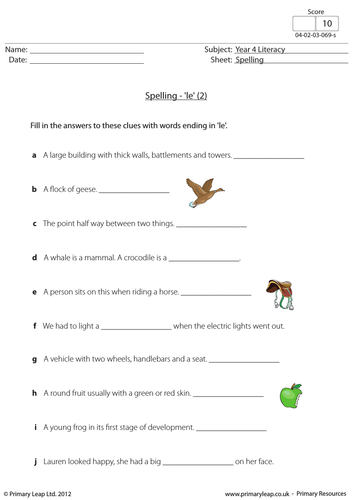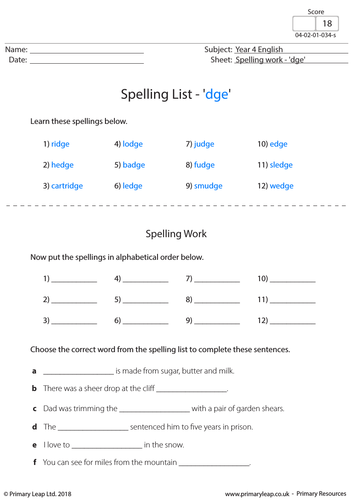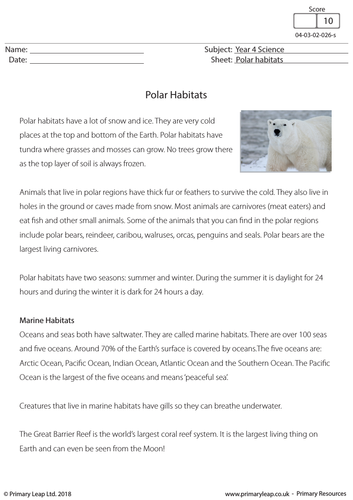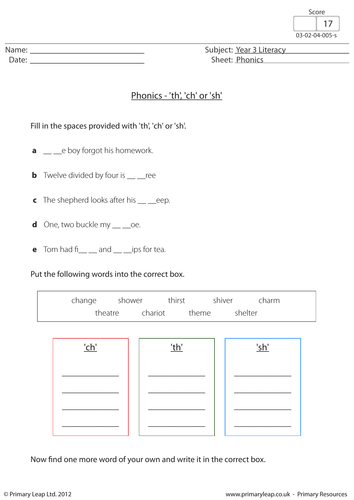560Uploads
453k+Views
210k+Downloads
English language arts

Beginning Consonant Blends 3
This worksheet was created by Lauren Savage @ Primary Leap
Look at the pictures and circle the correct consonant blend that starts each word. Write the consonant blend to complete each word.

KS2 English Resource: Spelling - 'le'
This year 4 spelling worksheet focuses on words ending in ‘le’. Children must read the clues and fill in the missing ‘le’ words.
This worksheet was created by Primary Leap

English Worksheet: Adjectives with Suffix - less
This year 3 English resource is designed to encourage children to use adjectives with suffix - less. Students write their own sentences using the words provided.

Spelling Worksheet - Halloween Theme
This Halloween worksheet includes 12 spellings for students to learn. Students put the spellings in alphabetical order and fill in the missing words to complete the sentences about Halloween.

KS2 English Resource - Concrete and Abstract Nouns
A primary English resource for students on sorting concrete and abstract nouns correctly.
This worksheet was created by Primary Leap

Haiku Poem - Christmas
This worksheet was created by Lauren Savage @ Primary Leap
A Haiku poem consists of 3 lines and 17 syllables and can be written on many themes. Students write their own poem based on the theme: Christmas.

Common Exception Words 3
Common exception words are ‘tricky words’ to read. Some exception words are used very frequently, which is why children should start reading and writing them at an early age. This English resource helps students practise reading and writing common exception words. They are asked to read the word and use it in a sentence.
Find more resources at Primary Leap

English Worksheet: Using the Correct Homophone (2)
This English resource is all about homophones. Homophones are words that sound the same but have different spellings and meanings. Students read the sentences below and choose the correct homophone to complete each sentence.
Find more resources at Primary Leap

KS1 Reading Comprehension - A Polar Bear Called Poldo
This KS1 reading comprehension includes a short piece of text with some facts about the polar bear. Children must read the text and then answer the questions that follow. This resource can be used to celebrate National Polar Bear Day and was created by Lauren Savage @ Primary Leap

Common Exception Words 4
Common exception words are ‘tricky words’ to read. Some exception words are used very frequently, which is why children should start reading and writing them at an early age. This English resource helps students practise reading and writing common exception words. They are asked to read the word and use it in a sentence.
Find more resources at Primary Leap

KS2 Spellings - 'dge'
A KS2 English resource including a list of 12 words with ‘dge’ for students to learn. There are exercises including putting the words in alphabetical order and choosing the correct word from the spelling list to complete the sentences.
This resource was created by Primary Leap

KS2 Science - Polar Habitats
This KS2 science resource was created by primaryleap.co.uk
This KS2 reading comprehension is all about polar and marine habitats. Students read through the text and answer the accompanying study questions.

Phonics - ch, th and sh
Learning phonics - a KS2 English worksheet that focuses on 'th', 'ch' and 'sh'. Children must fill in the missing letters and sort the words correctly. This resource is great for reading and spelling.

Active or passive?
An active voice is when the subject of the sentence is performing the act. A passive voice is when the subject of the sentence is having something done to it by somebody else. Often the word ‘by’ is used, but not always. This English worksheet asks students to write ‘active’ or ‘passive’ after each sentence.
This worksheet was created by Lauren Savage

Reading Comprehension - Christmas in Australia
This worksheet was created by Lauren Savage @ Primary Leap
What happens in Australia at Christmas? What is the weather like? Students are asked to read the text and answer the study questions.

Who Do We Remember On Remembrance Day?
We celebrate Remembrance Day on the 11th November. We remember the sacrifices of members of the armed forces and civilians in times of war, especially since the First World War. Students read through the passage and then answer the accompanying study questions.

Comparative and Superlative Adjectives
Students are asked to read the sentences and fill in the correct form of adjective. This worksheet was created by primaryleap.co.uk

Research Activity - Hanukkah
This worksheet was created by Lauren Savage @ Primary Leap
Hanukkah is the Jewish Festival of Lights and lasts for eight days. It usually falls in late November or December. Jewish people celebrate Hanukkah to commemorate the Miracle of the Oil. Here is a research activity for students to complete.

Making Inferences from Pictures - Halloween Resource
Students are asked to write 5 inferences they can make about the picture.
Additional worksheets, lesson plans, and interactive activities are available on Primary Leap.

Astronomy - Fact or Opinion?
A fact is a thing that is known or proved to be true. An opinion is a belief, judgment, or way of thinking about something. Students read the sentences about astronomy and write fact or opinion on the line.
There are 12 sentences included in this worksheet.
Find more resources at Primary Leap




















